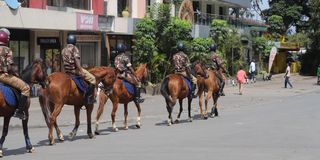CS Ruku said ‘Go to work’; Nakuru streets said ‘Go where?'

Police officers on horses patrol Oging Odinga street during Saba saba protests in Nakuru city on July 7,2025.
In a twist of irony that could rival any political satire, government offices across Nakuru County remained closed on Monday.
This, despite a tough-talking directive from Public Service Cabinet Secretary Geoffrey Ruku, who had earlier warned civil servants not to skip work during the Saba Saba protests.
But as the day unfolded, one question remained, how exactly were they supposed to get to work?
Major roads leading to the town where most government buildings are located were barricaded by police, turning the city centre into a ghost town.
Viral videos showed police officers stopping motorists, forcing essential workers to produce identification cards just to be allowed through an obstacle course that made a mockery of the very warning meant to enforce discipline.
The Regional Commissioner’s office building, entry was not restricted, but the offices were deserted with mostly those seen being the security personnel.
A similar scene played out at the county government offices, where not a single county vehicle was seen in motion proof that it wasn’t just the public staying home, but the ‘government’ too.
In Naivasha, following intelligence reports of planned attacks, Deputy County Commissioner Josiah Odongo ordered a full shutdown of all government offices, including law courts.
The caution wasn't misplaced, the AP Police Post in Viwandani (Kanjo) was set ablaze, and the busy Naivasha–Nairobi highway was rendered impassable.
Other sub-counties like Molo and Njoro followed suit, locking up offices due to the unrest.
When issuing the warnings in Embu, CS Ruku vowed to conduct impromptu spot checks and promised disciplinary action for absenteeism.
But unless he secretly parachuted into offices, it’s hard to imagine which office he could have inspected.
While Ruku’s warning was loud and clear, the streets spoke louder.
For Nakuru’s civil servants, Monday turned out to be an unofficial off day, sanctioned not by policy, but by protests, police barricades, and the curious clash between authority and reality.
